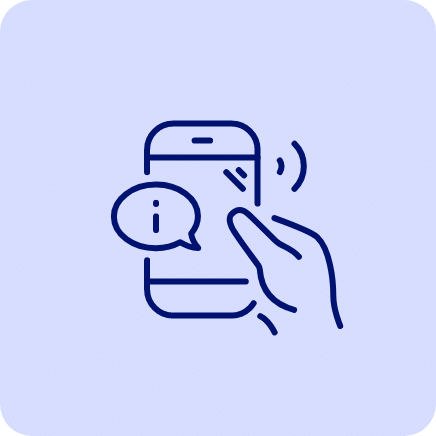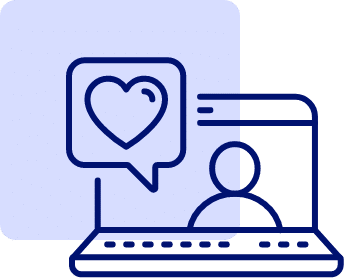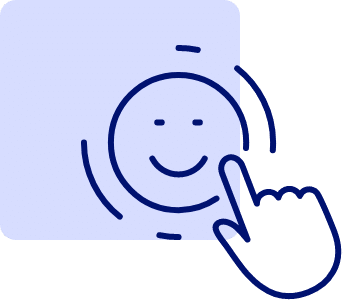Depression Treatment in Texas for Children & Teens
Begin a hopeful journey out of depression for your child or teen, helping them pave the way for a happier, healthier tomorrow.
Launch Your Child’s Healing Journey in Three Simple Steps

1. Get in Touch
Get started with Mind Works by filling out our simple contact form online or giving us a call.

2. Complete Intake Process
Submit all required paperwork so we can better understand your child’s history and needs.

3. Begin Treatment
Meet your child’s provider to establish a treatment plan and begin play therapy sessions.
Launch Your Child’s Healing Journey in Three Simple Steps

1. Get in Touch
Get started with Mind Works by filling out our simple contact form online or giving us a call.

2. Complete Intake Process
Submit all required paperwork so we can better understand your child’s history and needs.

3. Begin Treatment
Meet your child’s provider to establish a treatment plan and begin play therapy sessions.
Feeling Overwhelmed by Parenting Challenges?
Let’s Tackle This Together.
Parenting can be full of pressures, uncertainties, and challenges. Together, we’ll create a supportive plan tailored to your child’s needs, ensuring you both are set up for success.
Help Your Child Rediscover Hope and Purpose with Tailored Depression Care
At Mind Works, we recognize the profound impact that depression can have on the lives of children and teens, affecting everything from their academic achievements and social interactions to their overall sense of joy. As a parent, watching your child struggle with depression can cause you to feel understandably confused and helpless, especially if your child seems to retreat and resist the moment when you attempt to reach out.
Our team in Texas is committed to providing empathetic, holistic care for depression, incorporating assessments, tailored therapy, and carefully coordinated medication management into your child’s treatment plan when appropriate. Play therapy can be very beneficial for younger children, offering them an effective way to articulate their feelings and confront challenges in the most natural way they know – through play. For adolescents, individual counseling sessions offer a supportive environment to navigate their emotions, develop coping mechanisms, and build their sense of self-worth.

How Depression Treatment Helps Your Child Thrive at Home, School, and Play
You don’t need to let depression cloud your child’s or teen’s vibrant potential. At Mind Works, our targeted depression assessments and treatment are designed to restore hope and happiness, enabling your child to fully enjoy their youth and set a strong foundation for a healthy future. Here are just a few of the benefits of seeking depression treatment for your child.

Gain Insight Into Depression
Counseling can aid in demystifying depression for families, helping both children and parents to better understand depression, recognize its impact on daily life and emotions, and develop effective management strategies.

Rediscover Passion & Hobbies
Depression can lead your child to lose interest in once-loved hobbies. Through therapy, they can rediscover their enthusiasm and enjoyment in these activities, reigniting a sense of engagement and joy in their everyday life.

Boost Their Self-Esteem
Through play therapy or targeted talk therapy, your child can learn that they are adequate, worthy, and capable of achieving their goals. We’ll help your child learn self-compassion and replace negative self-talk patterns.

Strengthen Relationships
Depression can cause children or teens to withdraw from family and friends – leading to feelings of isolation and loneliness. Therapy will help your child to make friends, improve communication, and feel connected.

Improved Coping Skills
All children and teens face challenges – big or small. We’ll help your child to build resilience in the face of challenges and learn how to cope with setbacks, stress, or overwhelming emotions more effectively.

Support Academic Performance
Depression can negatively impact focus and motivation, making it difficult for your child to succeed in school. We’ll help your child to remove barriers and improve their academic performance and enjoyment.
How Depression Treatment Helps Your Child Thrive at Home, School, and Play
You don’t need to let depression cloud your child’s or teen’s vibrant potential. At Mind Works, our targeted depression assessments and treatment are designed to restore hope and happiness, enabling your child to fully enjoy their youth and set a strong foundation for a healthy future. Here are just a few of the benefits of seeking depression treatment for your child.

Gain Insight Into Depression
Counseling can aid in demystifying depression for families, helping both children and parents to better understand depression, recognize its impact on daily life and emotions, and develop effective management strategies.

Rediscover Passion & Hobbies
Depression can lead your child to lose interest in once-loved hobbies. Through therapy, they can rediscover their enthusiasm and enjoyment in these activities, reigniting a sense of engagement and joy in their everyday life.

Boost Their Self-Esteem
Through play therapy or targeted talk therapy, your child can learn that they are adequate, worthy, and capable of achieving their goals. We’ll help your child learn self-compassion and replace negative self-talk patterns.

Strengthen Relationships
Depression can cause children or teens to withdraw from family and friends – leading to feelings of isolation and loneliness. Therapy will help your child to make friends, improve communication, and feel connected.

Improved Coping Skills
All children and teens face challenges – big or small. We’ll help your child to build resilience in the face of challenges and learn how to cope with setbacks, stress, or overwhelming emotions more effectively.

Support Academic Performance
Depression can negatively impact focus and motivation, making it difficult for your child to succeed in school. We’ll help your child to remove barriers and improve their academic performance and enjoyment.
Begin Your Child’s Success Story
Ready to get started or have more questions for our team before moving forward? Give us a call or fill out a simple form online to start the journey toward your child’s thriving future.
Why Mind Works?

Specialized Expertise

Comprehensive Treatment Options

Collaborative Approach

Evidence-Based Care
Frequently Asked Questions:
Depression in children and teens is a serious mental health condition that goes beyond temporary feelings of sadness or “the blues.” It can affect every aspect of a young person’s life, leading to persistent feelings of sadness, irritability, loss of interest in activities, and sometimes even thoughts of suicide. It’s crucial to recognize the symptoms early, such as changes in appetite, sleep disturbances, low energy, difficulty concentrating, and withdrawal from social activities, as untreated depression can lead to prolonged issues and increase the risk of suicide.
It’s important to seek professional evaluation if you notice significant changes in your child’s behavior, mood, or academic performance, especially if they withdraw from activities they once enjoyed or exhibit persistent sadness, irritability, or fatigue. Early intervention can lead to more effective treatment outcomes.
Teen depression can often be mistaken for normal adolescent moodiness, but it involves more severe and prolonged symptoms like marked irritability, withdrawal, and a noticeable decline in academic performance. Warning signs can also include talk of suicide, reckless behavior, and giving away prized possessions.
For moderate to severe depression, SSRIs such as Fluoxetine (Prozac) and Escitalopram (Lexapro) are often recommended, alongside therapy. It’s vital to closely monitor for any side effects or changes in behavior, and treatment should always be managed by a healthcare professional.
Parents play a crucial role in supporting their child through depression treatment. This includes being actively involved in their care plan, encouraging open communication, fostering a supportive home environment, and working with healthcare providers to monitor progress and adjust treatment as needed.
If your teen exhibits any warning signs of suicide, such as talking about death, engaging in reckless behavior, or withdrawing from loved ones, it’s critical to seek immediate professional help. Providing a supportive and non-judgmental space for them to express their feelings is also important while ensuring they are safe.
Success Stories
“Highly recommend Mind Works. I am a clinician in Illinois and needed to find a clinic in Texas that could provide services to my client that was moving. This is no easy feat to do across the United States. Mind Works was fabulous to work with from the very beginning. Coordination of care was 5 stars and my “previous” client is very happy with their new counselor. Thank you very much for going above and beyond during this difficult time so many other counseling offices are facing. I appreciate all the help and coordination you offered my client!”
Shelley Skas
“I have known the owners for over 8 years and have taken a family member to Mind Works. Therefore, I can speak of them both personally and professionally. There truly is no better place for this service, especially for children and young adults. On the personal level, I know how much they truly care about everyone they meet. On a professional level, the entire staff is a reflection of the dedication to helping others and competence that gets results that the owners exude. During the incredibly trying time of this pandemic and the fear and anxiety it has caused many people, we are incredibly blessed to have Mind Works available to support.”
Jim West
Esther Kelly
“The front desk staff is kind and courteous and helped me find the right therapist for my child. When I met my therapist she was kind and explained the process to me. I love that she included me in the play therapy process and helped me understand how to help my child. Thankful for the therapists at Mind Works!”
Amira Maya-Martinez
“Mindworks is the leader in child centered play therapy and collaborative care in San Antonio and surrounding areas. Their focus is solely on the mental health of children and teenagers. Each clinician at all four locations is seasoned, knowledgeable, experienced, and capable. Parents trust that their child is going to get the treatment and services they need and deserve.
I thoroughly enjoyed working as a clinician at Mindworks. The support and leadership is consistent and outstanding. Unlike any other job that I have had, leadership and clinicians work together to cultivate an awesome work environment.”
Dana Carter
Help Your Child Soar to New Heights
A world of possibility awaits your child, and we’re so excited for the opportunity to help them work through roadblocks, improve their skills, and unleash their potential. Get in touch with our team and start your child down a happier, healthier path today!

